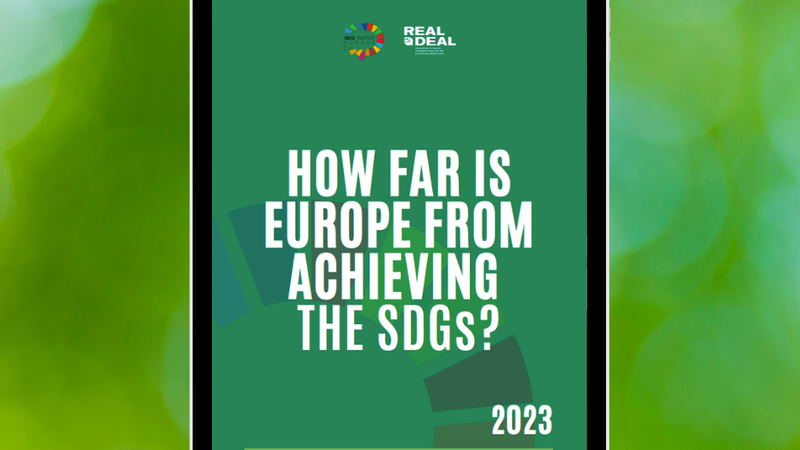
© SDG Watch Europe
Civil Society Organisations assess progress with new spotlight report launched at the HLPF 2023 in New York
The EU has the power to pass transformative laws and command the resources needed to drive the transition towards social justice and environmental sustainability, but is it living up to the challenge?
A new civil society spotlight report, prepared by SDG Watch Europe members in the framework of the Real Deal project, explains why the EU’s SDG reporting creates an illusion of sustainability and flags up serious gaps and challenges in the implementation of the SDGs.
In addition, it makes concrete policy proposals for bringing them to life with real stories and suggests key recommendations the EU can, with a bit of political will, easily use to create the transformation we need.
The report was launched at the recent High Level Political Forum (HLPF) in New York, where governments and other key stakeholders, including civil society organisations, meet to assess their progress and ‘accelerate’ implementation.
The objective of the spotlight report is to:
- Analyse the gaps that remain towards achieving the SDGs and the United Nations 2030 Agenda
- Identify Europe’s shortcomings and disconnections from other relevant processes and exchange views on how to address these issues and strengthen the SDG Implementation.
The collaboration among civil society organizations involved in the report demonstrate their commitment to evidence-based information and transparency in Europe. These principles are essential for guiding policy and fostering the democratic and participatory culture that we as civil society organisations value and wish to see reflected in Europe’s future policymaking.
The report includes 5 different chapters, mirroring the 5 P's of the SDGs for social, ecological and political transformation. Each chapter contains recommendations for EU policy makers.
People: Our current economic system seeks continuous growth, and recurrent economic crises become a necessary structural feature, with untold suffering for millions of people. It feeds on endless profit, extraction, production, and consumption, resulting in gross overconsumption, environmental destruction, and inequalities. Therefore, CSOs suggest focusing on an overarching strategy for SDGs, increased cooperation and coordination on social policies, targeted policies and initiatives to address poverty and inequalities, and better data collection.
Prosperity: To effectively ensure sustainable public finances, it is important to improve the tax system to make it fairer and more progressive. At the same time, the European economic governance review should embed powerful incentives for Member States to implement the necessary reforms. They must also increase public investment to address the economic, social and environmental challenges, while ensuring a just transition for all and with all. Key ideas in this chapter include the progressive reform of the European Semester, new Wellbeing indicators and going beyond GDP.
Planet: The European Union must take decisive action to tackle climate change, promote sustainable development, and improve social wellbeing. To achieve this, the EU should adopt a bold policy vision that incorporates ambitious targets, strengthened regulations, and innovative approaches to measure progress and promote sustainability. Key suggestions from CSOs include an EU-wide target for reduction of the material footprint, increasing the EU’s target to reduce its domestic greenhouse gas emissions by at least 65 % by 2030 and other binding targets for renewable energy and emissions cuts.
Peace: We need a new vision for the EU in the world based on human rights for peace, a transformative vision that can make the UN SDGs and the global climate and biodiversity agreements real and achievable. The EU in its ambition of champion of sustainable development and defender of human rights, according to the cultural value enshrined in its Treaties, must get behind a fundamental economic system change and renew the social contract to ensure peaceful and inclusive societies. Key recommendations include mainstreaming human rights-based approaches to climate action, counter shrinking civic space and ensure our democracies are protected, and tackle corruption by closing tax loopholes and stepping up efforts to counter tax avoidance.
Partnerships: The EU must support greater capacity building and work to renew international cooperation and build trust for the global common good. In light of enormous shifts in international relations and threats to multilateral cooperation, there should be a greater focus on policy learning by taking into account lessons learned in the first seven years of SDG implementation. Given the mismatch between the EU’s assessment in its Voluntary Review and the reports of independent scientists, analysts and civil society, the EU should consider using data and analysis from multiple sources in its monitoring and evaluation. Key ideas include a guarantee that trade deals will not externalise social and environmental impacts in other countries, improved structured dialogue mechanisms and funding for civil society, and a more meaningful integration of the SDGs in the EU’s Better Regulation toolbox.
In addition, the report delivers 6 overarching messages for EU policymakers on SDG implementation from civil society.
Key recommendations for policymakers
- Overarching Strategy: Introduce an EU Strategy for SDGs
- Wellbeing Economy: Replace GDP with indicators on wellbeing
- Live within our means: Reduce the European material footprint
- Social Justice: Truly leave no one behind by prioritising redistribution
- Stay on track: Improve EU monitoring on the structural and systematic gaps
- Lead by example: Ensure Policy Coherence for Sustainable Development
The full report is available online (click here to download).
Contact: Jeffrey Moxom; jeffrey.moxom@eeb.org
You read a blog post of one or more member organizations of SDG Watch Austria. The opinions contained therein are not positions of SDG Watch Austria or of ÖKOBÜRO as media owner.
